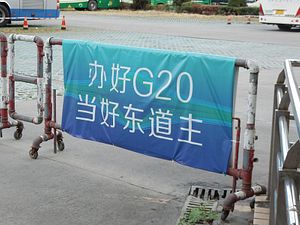There is now a new buzzword phrase in China’s foreign policy: “global governance.” In the most recent collective study session conducted by China’s Politburo, Chinese President Xi Jinping once again emphasized that China should make more efforts to participate in and contribute to global governance. The background here, of course, is China having successfully held the G20 summit in Hangzhou in early September. Why is China now so interested in global governance? There are two main reasons for this new move.
First, China has changed. Simply speaking, China today is one of the great powers in the world, next to the only superpower, the United States, in terms of comprehensive power. And as the saying goes, power comes with responsibility. This means China should make new and more contributions to the world after largely benefiting from a stable world order since the 1980s. China can no longer be just an onlooker of global affairs, as her interests have significantly expanded into every corner of the world and in every issue area. In other words, China now has both the capability and will to reform the existing system of global governance. Ever since Xi launched the “One Belt One Road” initiative three years ago, China has been actively searching for new modes of global governance.
Second, the world has changed along with China’s rise. There is no doubt that the world we are living in today is a complicated and fast-changing one. New issues such as cybersecurity and climate change pop up like mushrooms as new technologies emerge and societies evolve as well. Unfortunately, many of these issues cannot be resolved by any superpower alone or even a group of powers, as evidenced by the declining importance of the old elite club, the G7. Such issues call for the collective wisdom and efforts of all major players, including both developed and emerging powers; hence the rise of the G20 over the last ten years.
As the only remaining superpower in the world, the United States, however, faces serious challenges both at home and abroad, as evidenced by this year’s unpredictable presidential election involving two very different presidential candidates, with each pointing to a different approach toward global affairs. With the rise of anti-globalization forces in the United States and in the world, we can only expect some of the most serious global issues, such as climate change, to get worse and worse. This would harm China’s national interests too. This is the root of why China wants to actively reform the current system of global governance, and we have already seen some early results from Beijing, such as the Asian Infrastructure Investment Bank.
Of course, for China to play a more active and major role in global governance is no easy task. Long-held principles of “keeping a low profile” still dominate many Chinese people’s thinking, thus preventing China from coming up with brave and creative proposals of global governance. Also, China faces a serious shortage of experts, as Xi himself emphasized in the collective study. There are a variety of reasons why China does not have access to a large enough group of competent international experts, including culture, training, the rigid bureaucratic system, and so on. It will take some time before China can develop a group of skillful and open-minded global experts who can serve in prominent international organizations such as the United Nations and the International Monetary Fund.
In the meantime, we should be positive about China’s new approach to international affairs, as it signals a new type of international relations, placing emphasis on mutual respect and win-win situations. It will not be easy though, as evidenced by the disputes between China and others in the South China Sea. But a “global” approach is much better than any other unilateral approach. For this reason other powers should also actively engage with global governance.

































